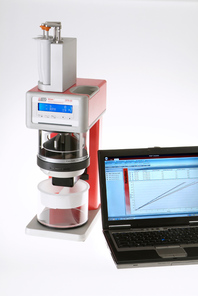Mütek DFR-05
Drainage Freeness Retention

Applicable standards:
Product code:
Lab simulation of drainage, freeness and retention processes onsite
The Mütek™ DFR-05 Drainage Freeness Retention simulates the retention and drainage conditions prevailing in a paper machine immediately before and during sheet forming. Chemical addition is fully automatic via a dosing module. The optionally available RET-20 Lab Sensor directly measures the filtrate consistency, making a manual determination of stock and ash consistencies superfluous. The drainage behavior is characterized by gravimetry of the filtrate volume.
- Systematical assessment of chemical influences in the papermaking process
- Characterize and screen retention agents and drainage aids
- Automatic consistency measurement
- Detection of Schopper-Riegler and Canadian Standard Freeness (CSF)
Benefits
- Develop and characterize retention agents and drainage aids the market demands
- Understand chemical reactions in the lab and onsite
- Apply the correct additive in a process environment
- Optimize chemical dosages for better operation and cost saving
- Accurate automated consistency results for fiber stock and pigments (ash) replacing time-consuming manual determination
- Transportable for onsite use
SYSTEM REQUIREMENTS
The Mütek™ DFR-05 is designed for use with a PC and application software. The RET-20 Lab sensor is optional. The instrument is intended for indoor use at temperatures in the range of 15 °C to 40 °C (59 °F – 104 °F). It is rated for voltages of 100 – 240 VAC at 50 Hz / 60 Hz.
The DFR is also available as a special freeness version, the Mütek DFR-05 Freeness.
SAMPLE SPECIFICATION
- Retention and drainage Stock samples in the consistency range of 0.2 % to 2 %. A sample volume of 1 liter is required per measurement. Since the sample temperature strongly impacts the test results, the temperature should be kept constant.
- Freeness Freeness measurement is performed in line with DIN EN ISO 5267-1 2000 which specifies that the sample is to be diluted to 0.2 % consistency using distilled water. Temperature should be adjusted to 20 °C. A sample volume of 1 liter is required per measurement.

